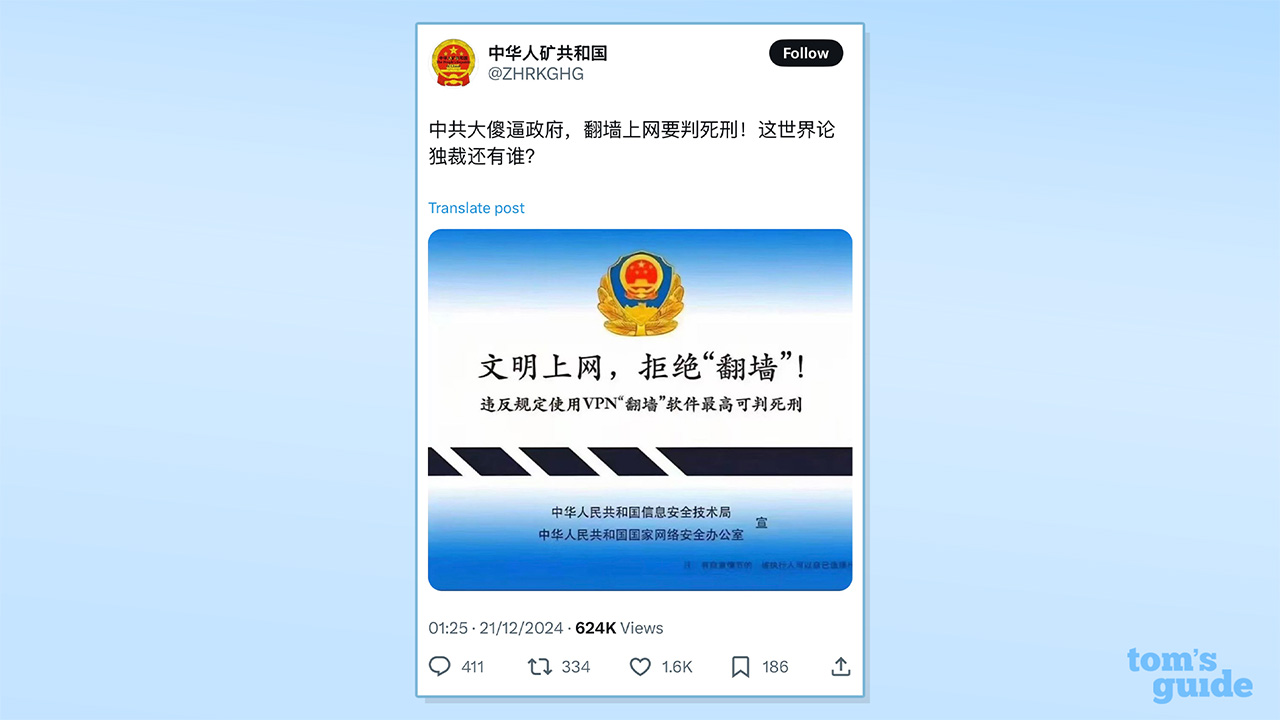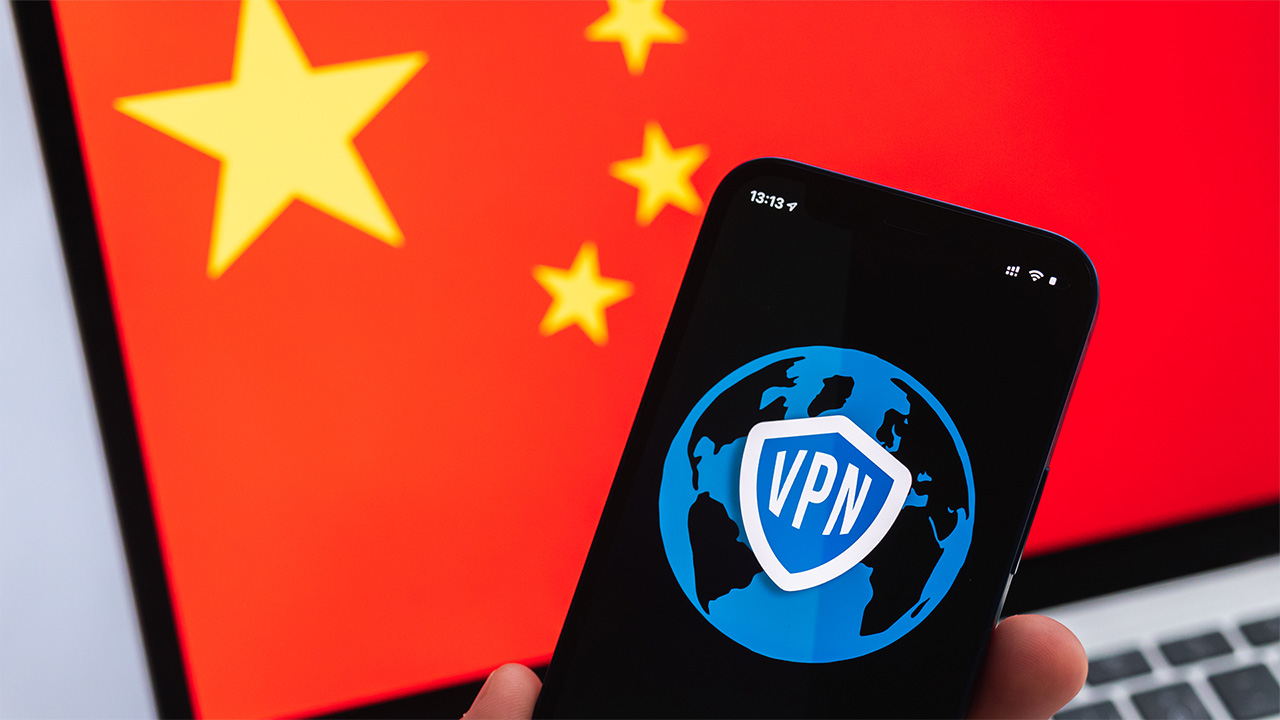No, you will not face the death penalty if you use a VPN in China
Claims circulating on social media are false

Despite rumors circulating on X (formerly Twitter) claiming that those caught bypassing the "Great Firewall of China" with a VPN could face the death penalty, we can assure you that this is not the case.
Although the Chinese government does restrict VPN usage and internet freedoms overall, using one of the best VPNs is still an option for those looking to unblock content and access the internet.
What's the rumor?
The rumor began with an image posted on X on 21 December 2024 titled "Civilised web surfing, reject VPNs." The simplified English translation of the text was reported to say "Those who violate regulations and use VPN software to circumvent the firewall could face a maximum penalty of death."
The translated tweet that accompanied the image appeared to call the Chinese government "stupid" for sentencing to death people who use VPNs to access the internet.
These claims are untrue, and despite strict VPN laws in China, you will not receive the death penalty for using one.
The account seems to be critical of the Chinese government and frequently shares misleading and unverified videos and photos. It has posted over 2,500 times and has 26,700 followers, with the false VPN image being seen over 600,000 times. This image was also shared on Threads and Facebook.

The image appears to be an announcement from "The Information Security Technology Bureau of the People's Republic of China" and "The National Cyber Security Office of the People's Republic of China" – neither of which exist.
The emblem used in the image matches that of the Ministry of Public Security, which oversees China's police force.
It did not take long for this to information to be checked and proven untrue by those in the know. However, not everyone will do this, and information is often taken at face value. To some, it is clear the account cannot be trusted as a source of information, but there are many online who may take its posts as fact.
Using VPNs in China
China has some of the strictest internet restrictions in the world, and the Great Firewall is very real. Many Western media platforms and services are blocked, and the country's media is highly censored and controlled.
As a result, VPNs are a lifeline for those in China, but there are strict rules in place. VPNs aren't illegal, and some are approved by the government, but these will not provide you with the same protection an independent VPN will.
Although you won't receive the death penalty, getting caught using a banned VPN in China can have serious consequences including penalties and imprisonment, and caution should be exercised because of this.

If you're travelling to China, it is vital you download your VPN before entering the country. Even though the VPNs work, you won't be able to access their websites or download their apps thanks to Chinese censorship, so having them installed and running beforehand is essential.
When looking for a VPN to use in China, it is crucial you purchase a VPN that has obfuscated servers – technology that hides the fact you're using a VPN at all. Without obfuscated servers, although your identity will still be safe – provided you're using a provider with a quality no-logs policy – you'll be unable to access blocked content because your VPN use will be detected.
Popular VPNs NordVPN and ExpressVPN are two of the best China VPNs, and two of our top-rated providers. They both offer obfuscated servers and have a good track record of bypassing Chinese censorship, although there are no guarantees – it may be worth having a couple of different VPNs available to you, in case one doesn't work.
NordVPN | 2 years + 3 months FREE | $2.99 per month
NordVPN is our pick for the best China VPN, and is #1 in our best VPN list. NordVPN is an incredible all-rounder, offering top-tier security, over 7,000 servers, and great features. Its super fast and can unblock almost anything – plus it's very easy to use. The 2-year plan works out at $2.99 per month ($80.73 up front), and you get 3 months extra protection for free, as well as a 30-day money-back guarantee.
ExpressVPN | 2 years + 3 months FREE | $4.99 per month
ExpressVPN is another good choice for a VPN that works in China. It's beginner friendly and boasts simple and easy-to-use apps. You are protected by its class-leading privacy and an array of new features have recently been introduced at no extra cost. Speaking of cost, ExpressVPN isn't the cheapest, with the 2-year plan equating to $4.99 per month ($139.72 up front). Although ExpressVPN gives you an additional 3 months of protection for free alongside a 30-day money-back guarantee.
Astrill VPN is another good choice for use in China and it is one of the most reliable VPNs for the country. Its Stealth VPN protocol specializes in evading the Chinese firewall, and it has a number of privacy and anonymity features designed to keep you hidden from the authorities.
These features do come at a cost, with Astrill VPN being very expensive. Its cheapest deal, the 2-year plan, works out at $12.50 per month. The 1-year plan works out at $15 per month, and protection for 1 month will cost $30.
Astrill VPN | 2 years | $12.50 per month
Astrill VPN is arguably the most reliable China VPN and has a strong reputation when it comes to bypassing the "Great Firewall of China." It utilises the Stealth VPN protocol, which specializes in evading the firewall and it boasts solid privacy and anonymity features. However, its apps are quite complex and it is very expensive. The 2-year plan comes to $12.50 per month ($300 up front) and there's no money-back guarantee.
As mentioned above, you should exercise caution when using a VPN to access the internet in China (or any country with strict internet laws). But if you are comfortable with the risks, a quality VPN with obfuscated servers will serve you well, allow you to evade the Great Firewall, and combat state censorship.

George is a Staff Writer at Tom's Guide, covering VPN, privacy, and cybersecurity news. He is especially interested in digital rights and censorship, and its interplay with politics. Outside of work, George is passionate about music, Star Wars, and Karate.



